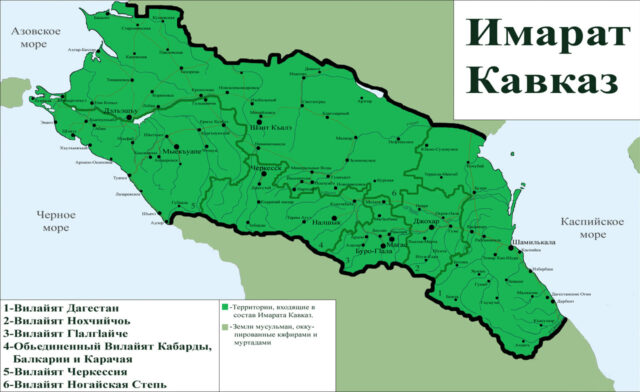
Kavkaz Files ISSN 2975-0474 Volume 21 Issue 1
Author: Giuliano Bifolchi
The recent arrest of a 23-year-old individual in Ingushetia, implicated in supporting online Imarat Kavkaz, underscores the persistent threat posed by this terrorist organisation in the North Caucasus region.
While empirical evidence suggests a strong diminished operational capacity on the ground, the organisation’s propaganda remains a potent force capable of influencing local sentiments.
The commendable operational successes of Russian security forces against Imarat Kavkaz members and Moscow’s strategic initiatives to enhance regional economic conditions have undoubtedly yielded positive outcomes. Nevertheless, the recent arrest prompts a critical inquiry into the potential for a resurgence of this terrorist entity in the foreseeable future.
The pivotal question arises whether, despite recent setbacks, Imarat Kavkaz could regroup, reinvigorate its capabilities, and once again pose a substantial threat to both regional stability and Russian national security. This development necessitates a comprehensive reassessment of counter-terrorism measures and a proactive approach to mitigating potential risks.
Background Information
On November 30th, 2023, Russian FSB employees arrested a resident of Ingushetia accusing of publishing post about Imarat Kavkaz. According to the Telegram Channel Operativnye Svodki, 23-year-old Salaudin Azhigov distributed information on VKontakte justifying the activities of the Caucasus Emirate.
The authorities opened a criminal case against Azhigov. They accused him of publicly calling, justifying, or promoting terrorism (Part 2 of Article 205.2 of the Criminal Code of the Russian Federation). The defendant is under recognisance not to leave the place.
Imarat Kavkaz: An Overview
Imarat Kavkaz, also known as the Caucasus Emirate, can trace its roots to the historical struggle for independence and autonomy in the North Caucasus. The region has a long history of resistance against external rule, dating back to the Russian conquest of the Caucasus in the 19th century. The resistance movements, often led by local leaders and warlords, sought to preserve their cultural and religious identity in the face of Russian expansion.
The First Chechen War (1994-1996) and the Second Chechen War (1999-2009) were pivotal in shaping the landscape of militant groups in the North Caucasus. These conflicts fuelled grievances and radicalised elements within the local population. As a result, various militant factions emerged, some of which espoused jihadist ideologies and sought to establish an Islamic state in the region.
In October 2007, Doku Umarov, a prominent Chechen militant leader, declared the establishment of Imarat Kavkaz, an organisation whose purpose was to establish an independent Islamic state encompassing multiple republics in the North Caucasus. The group rooted its ideology in Salafist interpretations of Islam and aimed to implement Sharia law in the region.
Since 2013, the Russian security forces killed Doku Umarov and most of the leaders of the organisation. Therefore, the Caucasus Emirate faced internal divisions and power struggles among its leadership mixed with a significant pressure from Russian security forces, which conducted counterinsurgency operations aimed at dismantling militant networks in the North Caucasus.
In 2015, Aliskhab Kebekov was killed in a suburb of Buinaksk. After him, leadership passed to Sharia judge Magomed Suleymanov, but he was also liquidated after a month and a half. After this, the appointment of the head of the group was not announced.
The group sought to align itself with broader jihadist movements worldwide, attempting to garner support from transnational networks sympathetic to its cause.
With the rise of the Islamic State in the Middle State and the international terrorist scenario, some Imarat Kavkaz’ s leader pledged allegiance to Abu Bakr al-Baghdadi. Therefore, the Islamic State declared the establishment of the Vilayat Kavkaz (Caucasus Province) which represented the organisation in the North Caucasus.
Risk Assessment
The persistent ideological influence of the Caucasus Emirate poses an ongoing security challenge in the North Caucasus, despite assessments indicating the cessation of its existence as a unified entity.
Abu Hamza, self-proclaimed Amir of the Mujahideen-Muhajirs of the Vilayat Nokhchichoy of Imarat Kavkaz, has emerged as an online representative, disseminating videos that focus on the North Caucasus situation, resistance against the Russian Federation, and the involvement of North Caucasian fighters in the Ukraine conflict.
Notably, the ‘Islamic media agency’ KavkazCenter.org and the portal ChechenInfo, recognised as the Information Agency of the Vilayat Nokhchichoy of Imarat Kavkaz, have become decisive in propagating Abu Hamza’s ideology and the earlier leaders’ rhetoric.
Despite a tangible improvement in the security landscape over the last decade, as evidenced by the low incidence of violent attacks with only 13 recorded victims from January to October 2023, the appeal of jihadist propaganda associated with the Caucasus Emirate underscores its potential to garner support within segments of the North Caucasian population.
The current security trajectory in the North Caucasus, marked by a decline in violent incidents, hinges on Moscow’s sustained commitment to regional socioeconomic development and robust security measures.
The emergence of North Caucasian volunteer battalions in Ukraine, engaged in combat against Russian armed forces, adds a dynamic layer to the security landscape. If Moscow falters in upholding regional development and security through its security forces, coupled with the proliferation of volunteer battalions, there is a tangible risk of the Caucasus Emirate re-surging as a regional threat.
Thus, proactive measures are imperative to address the underlying factors that contribute to the appeal of jihadist propaganda, and to fortify both the socioeconomic resilience and security apparatus in the North Caucasus, mitigating the potential resurgence of the Caucasus Emirate as a destabilising force in the region.
Do you like SpecialEurasia reports and analyses? Has our groundbreaking research empowered you or your team? Now is your chance to be a part of our mission! Join us in advancing independent reporting and unlocking the secrets of Eurasia’s complex geopolitical landscape. Whether through a one-time contribution or a monthly/yearly donation, your support will fuel our relentless pursuit of knowledge and understanding. Together, let’s pave the way for a brighter future. DONATE NOW and secure your place in shaping the geopolitical narrative.
